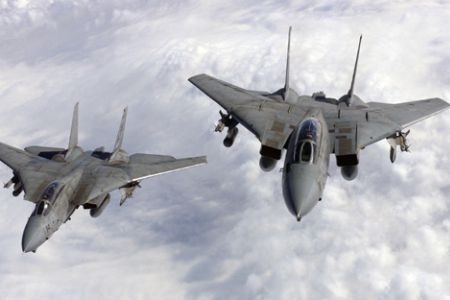LATEST: Insurgent “Revolutionary Command Council” Draws Fire From Other Factions
The Wall Street Journal, citing US and Turkish officials, caused a political and military flutter on Monday when it said Washington and Turkey were nearing agreement on a limited no-fly zone in northern Syria.
The Journal indicated the American shift, after more than two years of hesitation over protected zones, was linked to permission for the US to use Turkish airbases in its operations against the Islamic State.
However, the Pentagon quickly pulled back on the story, “Right now, we don’t believe a buffer zone is the best way to relieve the humanitarian crisis there in northern Syria.”
The White House echoed that “at this point” there was no consideration of a no-fly zone, although it was “open to a range of options”.
And the State Department added, “We haven’t made a decision about a specific course of implementation, we’re just continuing to have a discussion with Turkey.”
Another unnamed US official told The Washington Post that President Obama was briefed on the “outline” of a proposal last Wednesday but had not approved it.
The analysis? The US priority continues to be the fight against the Islamic State, rather than any pressure on the Assad regime. To pursue that effort — even as Washington does not seem to have established how to link its aerial operations with any group moving on the ground — the Americans need the Turkish airbases.
The Turkish Government’s priority is the removal of President Assad from power, as well as some relief from the swelling number of Syrian refugees. So it is trying to extract an important price for the airbases — a US commitment to even a limited area of “safe havens”.
Some US officials are willing to make that deal. But those officials do not include President Obama and his senior advisors.
So until they move — and the President has repeatedly stepped away from the option since summer 2012 — the US policy will continue to be one of uncertainty as it holds up the alternative of an incomplete war on the Islamic State.
Insurgent “Revolutionary Command Council” Draws Fire From Other Factions
Perhaps unsurprisingly, an effort to form an effective bloc of insurgent forces — the “Revolutionary Command Council” — has drawn fire from other factions.
Announced in August, the RCC includes Jaish al-Islam, Suqour al-Sham, Liwa al-Tawhid, and Ahrar al-Sham, key elements in the Islamic Front; the Noureddine Zengi Brigades; Jaish al-Mujahideen; the Free Syrian Army-linked 13th Division; the US-backed Harakat Hazm and Syrian Revolutionary Front; and other factions.
The initiative has been seen as an effort to bind together the key forces in the insurgency, amid the collapse of the Supreme Military Council which had been backed by the US since 2012.
The first organizing meeting of the RCC took place over three days last week in Gazientep in southeastern Turkey, adopting a political charter and confirming its leadership.
However, both Harakat Hazm and the Syrian Revolutionaries Front, apparently dissatisfied by the outcome, have used Reuters — a standard channel for their grievances with other insurgents — to announce their departure from the RCC.
“When we felt it was diverting from the principles of the revolution we dropped out,” a senior Harakat Hazm member said.
Jabhat al-Nusra Detain Leader of Free Syrian Army Battalion for “Corruption” in Rastan
Jabhat a-Nusra have detained the leader of a Free Syrian Army-affiliated battalion in Rastan in Homs Province, accusing him of corruption.
Hassan Ashtara had been a commander in Rastan since the opposition took control of it in 2012.
Jabhat al-Nusra announced on Saturday that, assisted by other factions, it had seized the commander: “Confirmation of the news of Hassan Ashtara’s arrest, leader of the corrupt, as he tried to escape to Turkey.”
Ashtara’s cousin Abdul Hamid condemned the detention:
We’re waiting for what the court wants to do with [Hassan], who was detained on groundless charges.
He is a well-known man, not an extremist. He does not follow any group or party.
Regime Assassination Campaign in East Ghouta Area Near Damascus?
Insurgents say the regime is pursuing an assassination campaign in the East Ghouta area, killing several opposition leaders in recent weeks.
“The Syrian regime is trying to destroy the internal structure of the mujahideen and rebels in the liberated areas…by using guerrilla warfare tactics,” said a spokesman for Jaish al-Islam.
Gunmen shot dead Hassan a-Rahib, a leader in Jaish al-Umma, in the town of Harasta on Sunday. A day earlier, Yusuf Abdul al-Wahab, a Jaish al-Islam leader, was slain in A-Rihan.
A week earlier, attackers killed the aide to Jaish al-Islam’s head of operations and the head of the Defected Soldiers’ Office in Hosh al-Dhawahara.

